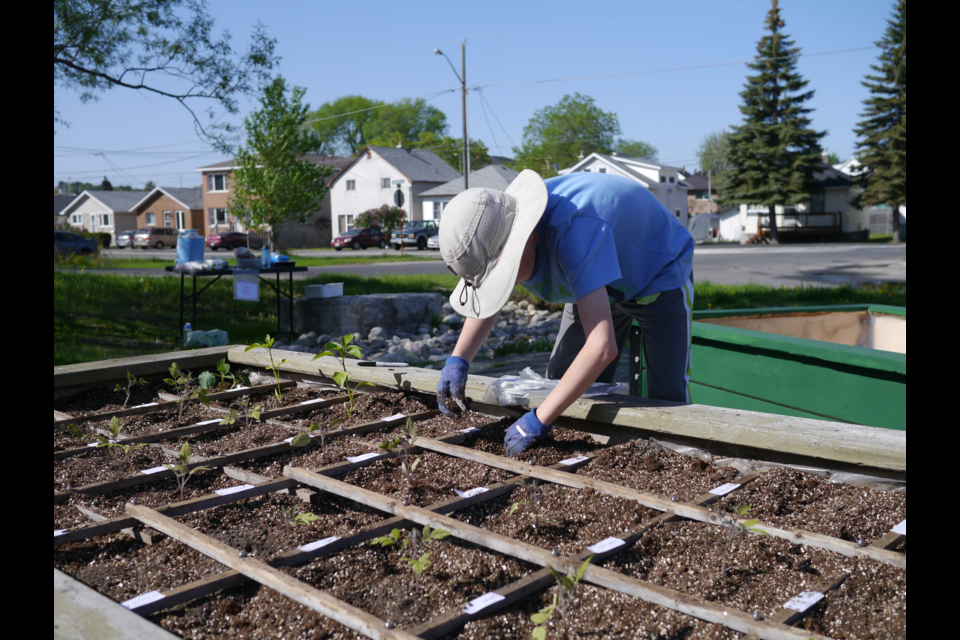Sharon Roy
Did you know that around 25-30% of greenhouse gas emissions are attributable to our food systems? The choices we make putting food on our plate can be a powerful climate action.
We can reduce the carbon footprint of what we eat in four ways: growing our own food, sourcing foods from local farmers, eating more plant-based foods, and reducing food waste.
Growing your own food shrinks your ‘food miles’ and helps ensure food security by providing a readily accessed supply of nutritious food. Sudbury Shared Harvest and the Sudbury Community Garden Network invite you to ‘Cultivate Your Neighbourhood’ and are offering support to help you grow food in your yard, balcony, or window, with resources like videos of tips and advice from experienced gardeners.
Community gardens are also a great place to grow food and learn growing skills.
In 2019, over 35 community gardens and food forest were in operation across Greater Sudbury. Greater Sudbury even has an urban farm. The Flour Mill Community Farm provides fresh affordable produce to residents, and trains and employs local youth.
Most of us are not likely to produce all of the food we need.
Erica Lagios, food strategy outreach co-ordinator with the Greater Sudbury Food Policy Council, explains that “if you go buy food down the street at a market booth from a farm within 50 km from your home, that’s a very different carbon footprint than buying from a grocery store that is the same distance from your home, but sells food brought in from across the country or continent, or even internationally.”
Local farms also tend to produce plants and livestock with naturally produced nutrient sources that ensure land is able to regenerate in healthy ways and water systems stay free from contaminants.
Eating more plant-based foods and less meat and dairy is one of the most effective ways to shrink your carbon footprint.
Motivated by both the environment and animal rights, local resident Emily Trottier stopped eating red meat at age 10, and eliminated all meats several years ago. She and her husband are raising their two children as vegans.
Trottier has developed approaches to make their diet simple and nutritious. She makes sure to always have a handy supply of fuss-free snacks such as nuts and pre-cut fruit and veggies. She has developed a modular approach to meal planning, using formulas for quickly assembling a pasta dish, a stir fry, and a grains and greens bowl from foods at hand.
This approach simplifies grocery shopping and helps ensure a varied and balanced diet. She says the most important step was to have herself and her husband on the same page about how to raise their children on a plant-based diet. She advises that forming positive relationships with the people caring for her children has helped to facilitate friendly and constructive discussions when issues arise about what to feed her children.
“It’s important to be solutions orientated,” she said.
Robin Wall Kimmerer, an Indigenous biologist and author of the book “Braiding Sweetgrass,” gets at the heart of the issue of our farming practices when she explains that sourcing food from the earth rather than from a styrofoam tray allows us to recognize our relationship to the earth as being reciprocal in nature.
While she recognizes that “we cannot all become hunter-gatherers,” we can still “behave as though the living world were a gift” by not sourcing food produced in ways that deplete the soil, poison our land and water, and cause suffering.
The Intergovernmental Panel on Climate Change reports that consumption of healthy and sustainable diets presents major opportunities for reducing greenhouse gas emissions from food systems, improving health outcomes, increasing food security, and increasing ecosystem health.
That’s a lot of good on our plate.
Sharon Roy is a guiding member of the Coalition for a Liveable Sudbury. Coalition for a Liveable Sudbury is a grassroots group of citizens and community groups who share a vision of Sudbury as a green, healthy and engaged community. For additional information on a net zero future for Greater Sudbury, see https://www.liveablesudbury.org/net_zero_sudbury.
